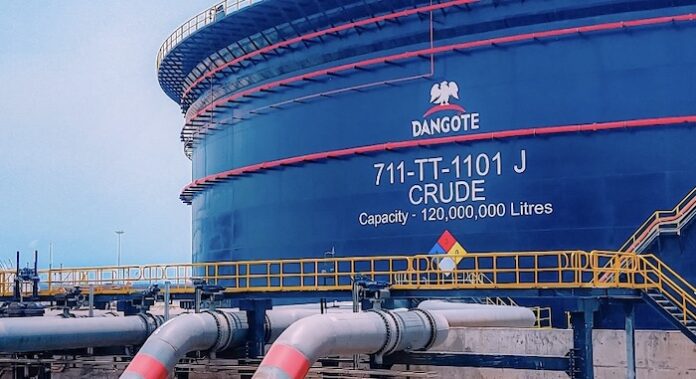Devakumar Edwin, vice president of Oil and Gas at Dangote Industries Limited (DIL), has reaffirmed that the 650,000 barrels per day (bpd) Dangote Refinery will begin producing Premium Motor Spirit (PMS) in July 2024.
Edwin made this announcement during an onsite tour of the Dangote Refinery at Ibeju-Lekki, Lagos, with a team from the international financial analytics corporation, S&P Global.
Edwin emphasized the refinery’s role in utilizing Africa’s abundant crude oil resources to produce refined products locally. This initiative aims to drive industrial development, create jobs, and foster economic prosperity.
Reassuring that the company is on schedule to meet its July deadline for petroleum production, Edwin stated that the refinery, currently operating at a capacity of 350,000 barrels per day, is set to increase to at least 500,000 barrels per day by July/August. At that point, it will begin refining petrol and ultra-low sulfur diesel.
He highlighted that the products from the $20 billion facility are of high quality, meeting international standards, and can satisfy 100 percent of Nigeria’s demand for petrol, diesel, kerosene, and aviation jet fuel, with excess production available for export.
The refinery is designed to process a wide variety of crude oils, including those from Africa, the Middle East, and US Light Oil, and adheres to Euro V specifications. It also complies with emission and effluent standards set by the US Environmental Protection Agency (EPA), the European Union (EU), the Department of Petroleum Resources (DPR), and the African Refiners and Distribution Association (ARDA).

Proudly noting that the refinery was built by a Nigerian company, Edwin remarked that it is the world’s largest single-train refinery complex, designed, engineered, and constructed by a Nigerian firm acting as its own Engineering, Procurement, and Construction (EPC) contractor. The facility includes a self-sufficient marine unit capable of handling the world’s largest vessels.
“The refinery can produce the best quality products in the world, Euro V grade. It is one of the most energy-efficient refineries and is highly environmentally friendly. It is sophisticated with a high level of automation. The largest single-train refinery in the world is 100 percent designed, engineered, and constructed by a Nigerian company as EPC contractor,” Edwin said.
Meanwhile, Ravi Bhatia, Director and Lead Analyst of Sovereign and International Public Finance Ratings at S&P Global Ratings, led the delegation to Lagos. He stated that the Dangote refinery would transform Nigeria into a net exporter of petroleum products. This transformation is expected to boost revenue and alleviate pressure on the country’s foreign exchange reserves.
Bhatia added that the Dangote Oil Refinery and Petrochemicals company could resolve Nigeria’s foreign exchange issues and ease the pressure on the local Naira currency, while also spurring economic development.
“It is a very impressive facility, able to process 650,000 barrels a day when at full capacity. It is the largest single-train refinery complex in the world. It came out quite quickly. Nigeria is a big exporter of crude but has issues with importing refined fuels.
So, there is a gap in the market where crude can be refined in Nigeria, save money that way, and potentially save some foreign exchange. This will be positive for the economy in the medium term. It looks positive from our assessment,” Bhatia said after touring the facility.
The S&P team praised Aliko Dangote, President of Dangote Industries Limited, for integrating advanced technologies and quality control measures, including a state-of-the-art Central Control Unit that ensures smooth automation of operations.
The delegation also included Associate Director of Sovereign Ratings, Maxmillian McGraw; Director of Corporate Ratings, Omegu Collocott; Senior Analyst of Bank Ratings, Charlotte Masvongo; and Director of Financial Services, Samira Mensah, accompanied by officials from the Federal Ministry of Finance.
Nigeria, one of the world’s leading oil producers, exports all its crude oil for refining and subsequently imports refined products due to a lack of operational refineries. It is estimated that Nigeria imports at least 50 million liters of petrol per day to meet domestic demand.
Data from the National Bureau of Statistics (NBS) in its Foreign Trade Statistics for the Fourth Quarter of 2023 shows that Nigeria spent approximately N12 trillion on petroleum product imports in 2023, including premium motor spirit (PMS), commonly known as petrol. This figure represents an 18.68% increase compared to the N10 trillion spent on fuel imports in 2022.




